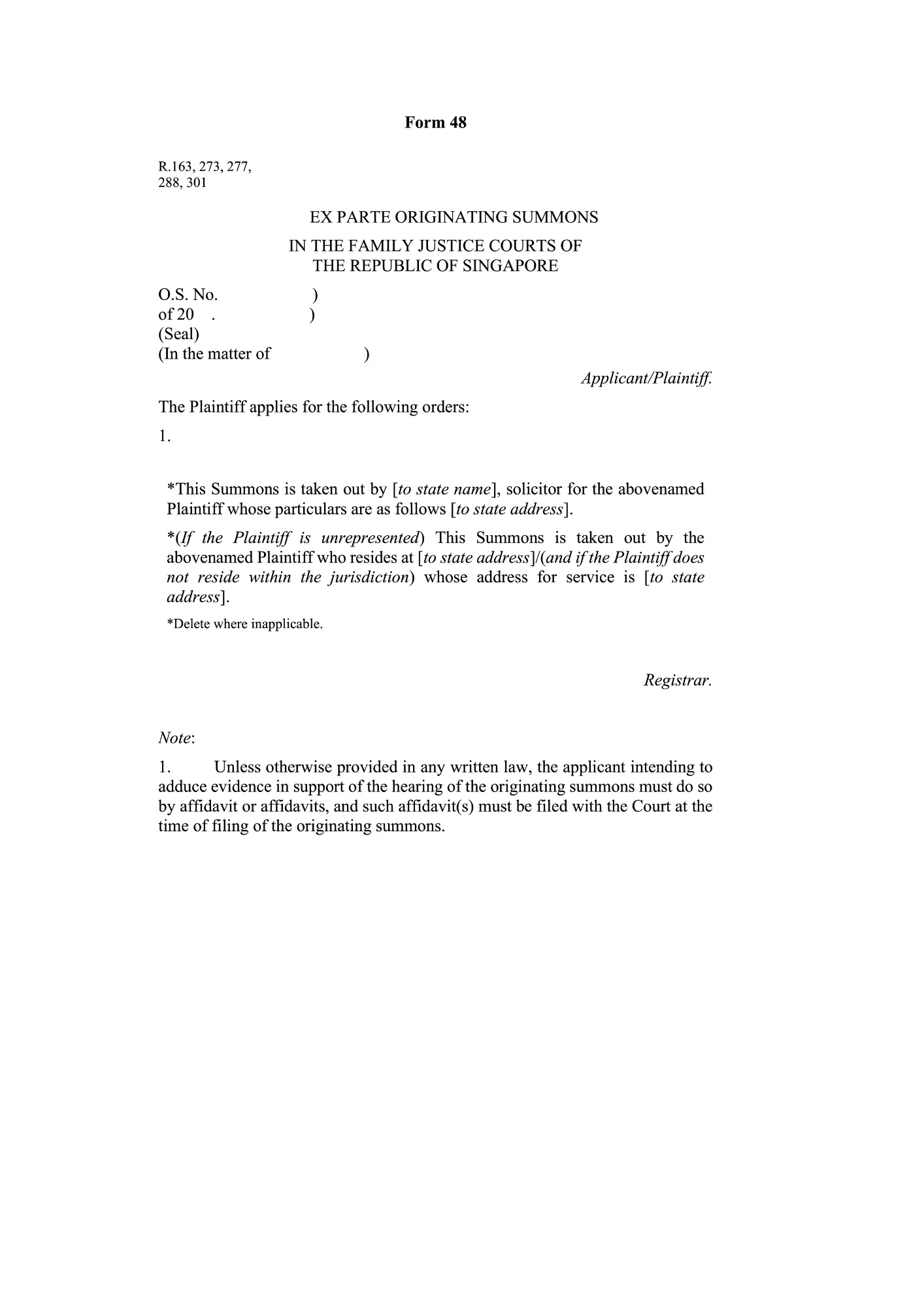Table of Contents
- circle Who Can Apply for an Ex Parte Originating Summons?
- circle What is an Ex Parte Originating Summons?
- expand_circle_right When is an Ex Parte Originating Summons Used?
- circle Conclusion
When a loved one passes away, managing the estate of the deceased person can be a complex and time-sensitive process. In Singapore, the probate process is necessary to legally distribute the deceased’s assets.
This article will guide and assist you through how to kickstart the probate process using an Ex Parte Originating Summons, when filed both with and without a Will. By understanding this process and law, you can ensure that all is not lost following the death of a loved one.
Who Can Apply for an Ex Parte Originating Summons?
An Ex Parte Originating Summons can be filed by the executor named in the deceased’s Will or the next-of-kin if there is no Will. If you have legal representation, your lawyer can file the Ex Parte Originating Summons on your behalf.
It is a required step in the probate process to obtain the necessary court orders to manage and distribute assets of the deceased’s estate.
For more information on the roles of an Executor or Administrator (often next-of-kin) and an example of how they differ, read our article on - “Administrators and Executors: Who, What and Why”.
What is an Ex Parte Originating Summons?
An Ex Parte Originating Summons is a legal document used to give notice to start certain court proceedings. All Ex Parte Originating Summons must adhere to the Family Justice Rules or the Rules of Court, which specifies the forms and supporting documents required. It is a standard procedure in the probate process to obtain the court’s approval to administer the deceased’s estate.
An Ex Parte Originating Summons (Form 48) looks like this:

When is an Ex Parte Originating Summons Used?
An Ex Parte Originating Summons is a document used in all probate cases, whether the deceased left a Will or not. It is a necessary step to obtain the court’s approval to manage and distribute the estate.
We discuss the differences in procedures below between:
- Using an Ex Parte Originating Summons with a Will.
- Using an Ex Parte Originating Summons without a Will.
1. Using an Ex Parte Originating Summons With a Will
The Step-by-Step Process:
Step 1: Prepare the Necessary Documents
-
Death Certificate
Obtain the official death certificate of the deceased.
-
Certified True Copy of the Will
Ensure you have a certified true copy of the deceased’s Will. You will need to file the certified true copy with the court, but you must also present the original Will for the court’s inspection.
-
Fill out the Statement in Form 51
Completing and filling out of form 51 is necessary as it sets out the particulars of the applicant and the beneficiaries.
Step 2. File the Summons
-
Submit Documents
File the Ex Parte Originating Summons (Form 48) and all supporting documents with the court.
-
Pay Filing Fees
Pay the required court filing fees.
For the most accurate and up-to-date information on filing fees, you can visit the Singapore Courts website here.
Step 3: File the remaining necessary court documents
-
Administration Oath, Supporting Affidavit, and Schedule of Assets
Once, your summons has been accepted, prepare and file these documents. If you have not collated the information on all the assets yet, you may file the schedule of assets and a supplementary affidavit at a later stage.
Step 4: Court Hearing
-
Initial Review
The court will review the application.
-
Preliminary Orders
If the court is satisfied, it will inform you of whether your application has been approved.
🆗👍After the court grants preliminary orders, this is when the executor can start attending to urgent matters related to the estate.
Step 5: Grant of Probate
-
Filing Any Outstanding Documents: You would need to file your schedule of assets and supplementary affidavit first before the Court issues the final Grant of Probate.
Alternatively, you may consider engaging a lawyer and they will help sort all these for you.
-
Final Orders: The Court will then issue the Grant of Probate, completing the probate process and the distribution of assets can officially proceed.
2. Using an Ex Parte Originating Summons Without a Will
The Step-by-Step Process:
Step 1: Prepare the Necessary Documents
- Death Certificate: Obtain the official death certificate of the deceased.
- Statement: Prepare a statement setting out the particulars of the applicant (next-of-kin) and the beneficiaries.
Step 2: File the Summons
-
Submit Documents
File the Ex Parte Originating Summons and all supporting documents with the court.
-
Pay Filing Fees
Pay the required court filing fees.
Step 3: File the Necessary Court Documents
-
Administration Oath, Supporting Affidavit, and Schedule of Assets
Prepare and file these documents. If you have not collated the information on all the assets yet, you may file the schedule of assets and a supplementary affidavit at a later stage.
This process is essentially the same as when filing with a Will (as mentioned above), except you do not need to file a Will along with this application.
👍🆗Once the court issues preliminary orders, this is when the administrator can begin addressing urgent matters related to the estate immediately.
Step 4: Court Hearing
- Initial Review: The court will review the application without notifying other parties initially.
Step 5: Letters of Administration
- Final Orders: The court will eventually issue the Letters of Administration after a thorough review. Only then can the administrator distribute the assets.
- Notification of Other Parties: After the preliminary orders are granted, the court will notify other potential interested parties.
If you find yourself lost during this process, you may reach out to a lawyer and they will simplify matters for you.
Conclusion
Managing a loved one’s estate can be a complex and time-sensitive process. Using an Ex Parte Originating Summons can help expedite the initial steps of the probate process, allowing you to address urgent matters quickly. However, the full probate process must still be completed to distribute the assets legally.
The Ex Parte Originating Summons can be filed in the Supreme Court or the District Court, depending on the complexity of the case.
How WillCraft Can Help
Understanding the probate process and the use of an Ex Parte Originating Summons highlights the importance of having a well-drafted Will. By creating a Will with WillCraft, you can ensure that your estate is managed according to your wishes, reducing the need for urgent legal interventions.
WillCraft offers a convenient and affordable way to create a legally valid Will. Our platform makes it easy to create a legally valid Will and provides expert guidance and tips as you go about making your Will with us. We even include lawyer review and witness for just a small additional fee. Don’t wait - secure your family’s future now and provide peace of mind for you and your loved ones.
Need to kickstart the probate process in Singapore to get court approval?
Visit WillCraft to get started today!
Note: Trying out WillCraft's interface is free! No credit card is required.
Frequently Asked Questions
What is an Ex Parte Originating Summons?
An Ex Parte Originating Summons is a legal document used to start certain court proceedings or civil action against other parties without notifying other parties initially. Individuals without legal representation can file the application at a CrimsonLogic Service Bureau.
Who can apply for an Ex Parte Originating Summons?
The executor named in the deceased's Will or the next-of-kin if there is no Will can apply for an Ex Parte Originating Summons.
When is an Ex Parte Originating Summons used?
It is used in all probate cases, whether the deceased left a Will or not, to obtain the court's approval to manage and distribute the estate.
What documents are needed to file an Ex Parte Originating Summons?
Necessary documents filed will include the death certificate, a certified true copy of the Will, and a statement setting out the particulars of the applicant and the beneficiaries. After filing the necessary documents, you may be required to attend a pre-trial conference.
How long does the probate process take in Singapore?
The probate process can take several months, typically between 6-12 months, depending on the complexity of the case.
What are the benefits of using an Ex Parte Originating Summons?
Benefits include quick court intervention, simplified process, protection of assets, quicker access to funds, and legal clarity.
